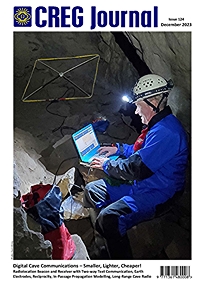
- The most recent issue to be published was 132
- For further information, please see Publishing/Despatch Schedule
- Database last updated on Mon, 01 Dec 2025 18:30:34 +0000
- Online access is currently available for all issues. Some of
the older issues are bit-map scans rather than digital copies.
journal scans.
- Online voting for CREG articles was withdrawn in June 2022. For info see
Voting for CREG articles
Contents of journal 124
December 2023
This page may take a few
seconds to load. Please wait ...
- CREG Journal 124 (0-24)
(PDF 3.7MB)
  Individual articles may be available below Individual articles may be available below
- This issue has a cover date of December 2023 and was published on 5 December 2023.
-
- Front Cover (1)
(PDF 1.4MB)

- Ken Smith sending a text message in Rat's Nest Cave, Alberta, using a QDX-M radio on 137.5 kHz. The radio is the small box with red LED just above Ken's right hand. Photo: Gavin Elsley
-
- Contents (2)
(PDF 263KB)

- List of contents and masthead information.
-
- News and Notes (2) For download see previous item
- Change, David Gibson.
-
- Digital Cave Communications – Smaller, Lighter, Cheaper! (3-5)
(PDF 739KB)

- Ian Drummond, VE6IXD, reports on the development and testing of a newly available low-cost digital transceiver, modified to operate on 137.5 kHz. Employing weak signal modes such as WSPR and FT8, ranges of up to 3 km have been achieved using small loop antennas.
-
- ARCANA 2023 – Radiolocation Beacon and Receiver with Two-way Text Communication (6-8)
(PDF 553KB)

- ARCANA 2023 breaks new ground in being designed for radiolocation, but providing communication from cave to surface and vice versa to assist in the efficient organisation of the location process. Jean-Louis Amiard provides an overview of the system.
-
- A Semi-empirical Approach to Microwave Propagation Modelling in Caves (9-15)
(PDF 696KB)

- Mike Bedford and Gareth Kennedy describe a semi-empirical approach for modelling microwave propagation in natural caves. The method provides significantly improved accuracy compared to modal analysis. In addition, it does not require access to a detailed lidar-derived 3D model and specialist software, as required for ray tracing, the other main method that has been applied to this type of environment.
-
- We Hear (16)
(PDF 287KB)

- Roundup of news and events: Mike Bedford brings us the latest to impact the world of cave radio and electronics. BHI Introduces ANC Headphones, Niobium to Improve Lithium-Ion Batteries, Inertial Navigation Device from Moasure.
-
- Reciprocity and Radiation (17-20)
(PDF 348KB)

- Reciprocity is a property of passive electrical networks and electromagnetic fields. In a previous article David Gibson showed that nonradiating cave radio antennas behave as passive networks and obey simple reciprocity laws. In this follow-up article he demonstrates the wellknown observation that radiating antennas also obey the reciprocity principle. This is a slightly more complex demonstration as it requires a discussion of radiation resistance, impedance matching and fundamental thermodynamics.
-
- Building Blocks (21)
(PDF 282KB)

- Suggestions to minimise the impact of corrosion on electronic devices for underground use, by Tony Haigh.
-
- Earth Electrodes for Cave Radios – a Practical Guide for Deployment (22-23)
(PDF 325KB)

- Pushing electrodes into the ground, as required for a cave radio antenna, might seem a trivial process but, as Mike Bedford explains, several aspects need to be considered in order to obtain the best performance. This article is #8 in our Fundamentals series.
-
- Long-Range Cave Radio (24)
(PDF 291KB)

- Ian Drummond, VE6IXD, and Ken Smith, VE6AGR, have achieved a range of several kilometres using sensitive receiving methods to receive the far magnetic field, as distinct from near-field components.
-

|

View Contents:

BCRA is a UK registered charity and is a constituent body of
the British Caving Association,
undertaking charitable activities on behalf of the BCA.
BCRA publishes a range of periodicals and books.
Click here for further information.
|
Searching
To Search our pages using Google, type a search
string in the box at the top of the page and hit your Return key
You can also search our publications catalogue at the British Caving Library
The CREG Journal Search Engine is a new, powerful search engine which will, sometime, be extended
to cover Cave & Karst Science. We have a keyword search facility on our Cave Science Indexes pages but this may be rather out-of-date.
|
For staff use: Link to Database
Show/Hide
download figures next to each item (if available and non-zero; you might need to refresh page first). Counters last
reset on Thu 03-Jan-2019 17:29:28 +00:00. The figures are non-unique
click-throughs.
|









